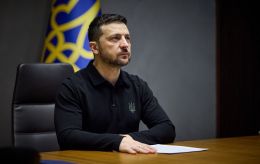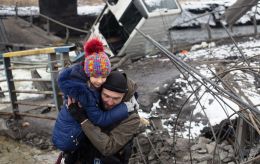US concerned about Russia's support for North Korea's nuclear program
 Photo: US Ambassador to the UN Linda Thomas-Greenfield (photo from open sources)
Photo: US Ambassador to the UN Linda Thomas-Greenfield (photo from open sources)
The US expressed concern at the United Nations Security Council meeting over Russia's plans to support North Korea's nuclear program. This would undermine the long-standing campaign for the denuclearization of the Korean Peninsula, reports Reuters.
Reuters reminded that in September, Russian Foreign Minister Sergey Lavrov declared the issue of "denuclearization" (nuclear disarmament) of North Korea closed for Moscow. He stated that the Kremlin understands Pyongyang's logic, as the regime relies on nuclear weapons as the cornerstone of its defense.
US Ambassador to the UN Linda Thomas-Greenfield stated during the Security Council meeting on December 18 that "alarmingly, we assess that Russia may be close to accepting North Korea's nuclear weapons program." She added that this would overturn decades of Russia's commitment to supporting the denuclearization of the Korean Peninsula.
"We believe that Moscow will become more reluctant not only to criticize Pyongyang's development of nuclear weapons but also further obstruct the passage of sanctions or resolutions condemning North Korea's destabilizing behavior," she said.
South Korea and the United Kingdom criticized Lavrov's statements, saying they undermined the global non-proliferation regime.
James Kariuki, Britain's Deputy UN Ambassador, described the Russian minister's comments as a "reckless departure from the agreed principle of complete, verifiable and irreversible disarmament."
Russia's sovereign right and nuclear war in Asia
During his speech at the UN Security Council, Russia's UN Ambassador Vasily Nebenzya did not mention North Korea's nuclear program. However, he defended the strengthening of cooperation between Moscow and Pyongyang, calling it Russia's sovereign right.
"Russian cooperation with the DPRK ... is in accordance with international law, not in violation thereof. This is not directed against any third countries. It does not pose any threat to states in the region or the international community, and have no doubt we will continue to develop such cooperation," Nebenzya said.
Meanwhile, North Korea's UN Ambassador Kim Song called the closer ties with Russia a "positive contribution to international peace and security."
He also mentioned that Pyongyang views the nuclear military bloc led by the US in the region: "Outbreak of the nuclear war in Northeast Asia is no longer a possibility, but a matter of time."
Provocative scheme of Pyongyang
South Korea's UN Ambassador Joonkook Hwang warned the Security Council to "expect further uncertainties looming over the horizon" ahead of US President-elect Donald Trump's inauguration for his second term in January 2025.
"North Korea has a history of provocative actions during US presidential transitions, designed to grab attention, raise the stakes, and set the stage for direct negotiations with the new US administration," Hwang said.
"This pattern can recur within the upcoming months. This time, it could be another ICBM (intercontinental ballistic missile) or military satellite launch or even its seventh nuclear test," he said.
North Korea has been under UN Security Council sanctions since 2006. These measures have been steadily strengthened to halt Pyongyang's development of nuclear weapons and ballistic missiles.
North Korea-Russia cooperation
Russia has established closer diplomatic and military ties with North Korea since the invasion of Ukraine in February 2022. Over the past year, Vladimir Putin and North Korean leader Kim Jong Un have visited each other's countries.
Additionally, in the fall, North Korea sent around 10,000 troops to fight against the Ukrainian Armed Forces in the Kursk region.
As of today, according to Ukrainian intelligence, North Korean forces have lost about 200 soldiers.
According to the Pentagon, hundreds of North Korean soldiers have already been killed at the frontlines in battles against the Ukrainian Armed Forces.

